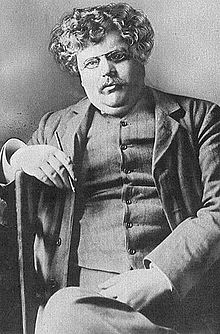Is this the face of a “conservative”?
On NRO, Lee Habeeb and Mike Leven offer what they call a “moral case for conservatism.” They invoke the great debate a century ago between George Bernard Shaw and G.K. Chesterton:
Shaw, sounding like a modern progressive, said this about wealth and equality:
The moment I made up my mind that the present distribution of wealth was wrong, the peculiar constitution of my brain obliged me to find out exactly how far it was wrong and what is the right distribution. I went through all the proposals ever made and through the arguments used in justification of the existing distribution; and I found they were utterly insensate and grotesque. Eventually I was convinced that we ought to be tolerant of any sort of crime except unequal distribution of income.
In came Chesterton:
We say there ought to be in the world a great mass of scattered powers, privileges, limits, points of resistance, so that the mass of the people may resist tyranny. And we say that there is a permanent possibility of that central direction, however much it may have been appointed to distribute money equally, becoming a tyranny.
Chesterton added, “Mr. Shaw proposes to distribute wealth. We propose to distribute power.”
All great stuff, to be sure. But there are two problems with this approach.
1) Chesterton’s concerns about the centralization of power, simply as such, are no longer easily identified as “conservative” in the current use of the term. Today, unlike a century ago, hostility to centralized power is as much invoked in support of progressive policy as conservative. This is not simply a matter of the old trick by which politicians centralize power by posing as opponents of centralized power. There is still plenty of that, of course. The new factor is the existence of a substantial intellectual movement that sees capitalism and socialism as equally tools of oppression by the powerful and responds by rejecting the modern economy entirely. And this was more or less Chesterton’s position as well. Chesterton is one of the fathers of the naive and unworkable idea of “distributism,” in which private property and freedom of exchange are respected (as in capitalism) but large accumulations of weath, and large corporations primarily owned by a small investor class, are not permitted to arise (by what means is never specified). The idea seems to be that we can get back to the Shire if we all just wish hard enough.
This is a challenge for Habeeb and Leven’s case because the traditional moral, metaphyiscal and religious justifications for a free economy as against socialism are no longer unambiguously deployed only in favor of capitalism. Chesterton was one of the originators of this movement; now it has reached sufficient maturity to remove the necessary social preconditions for the kind of argument Habeeb and Leven want to make. Those who reject the modern economy simply as such must be accounted for.
The starting point for that accounting is to explore why those who say they reject both capitalism and socialism always, without exception, end up empowering socialism. There are good reasons for that. But that’s a line of thought to develop another day.
2) Suppose we succeeded in establishing that what Chesterton means by the “distribution of power” – that is, the primacy of the dignity of the human person over the claims of the state to serve as Platonic guardian – requires that we support broadly capitalistic economic policies (with allowances for reasonable regulation, a moderate safety net, etc.). Can that agenda succeed if it is identified with “conservatism,” which is one side in a deep ideological rift – and not the more powerful one culturally?
In fact, doesn’t the identification of this agenda with conservatism ensure its failure? Because if we establish that conservatives are for the dignity of the human person as against the claims of the state to serve as Platonic guardian, we equally establish that those who are not conservatives are not for that. Thus we reduce what ought to be, and what once actually were, robust moral commitments that ran deeper than party and ideological lines to a mere contested poilcy preference.
Robert Sirico has said that “the only society worthy of the human person is a society that embraces freedom and responsibility as its two indispensable pillars.” I would add that the only society capable of embracing them as indispensable pillars, rather than as the transient policy preferences of one party, is a society in which those pillars are accepted as trans-partisan moral commitments, rooted in the deep bedrock of a shared national culture.

Pingback: The Riddler and the Samaritan | Hang Together